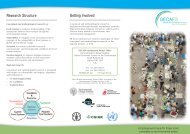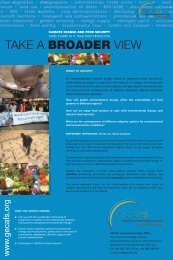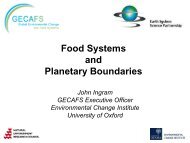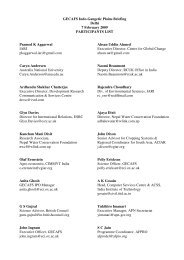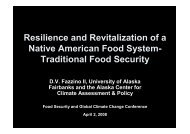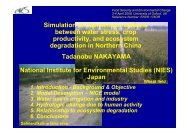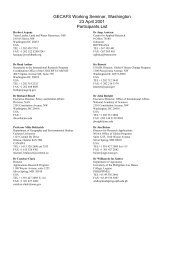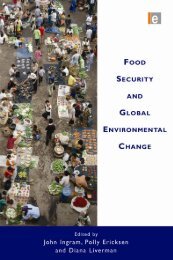communities operating in food systems on a range of scales and levels can be helped bydrawing on ecological notions of interconnectivity, community behaviour and spatialorganisation. Valuable lessons can be learnt from production ecology in terms of the‘defining’, ‘limiting’ and ‘reducing’ fac<strong>to</strong>rs for some of the nine individual food securityelements in Paper 3 (Figure 1; Box 1), notably production, distribution, affordability andnutritional value. However, and unlike the production situations discussed above, these arenot necessarily additive when taken across the whole food system. Fac<strong>to</strong>rs affecting foodsystem elements interact in a multiplicative (rather than additive) manner, especially if theyare, in turn, affected by an overarching, exogenous driver. For instance, an increase in theworld oil price will directly – and concurrently – affect a number of food security elementsfor economic reasons: food production, due <strong>to</strong> fertiliser price; food distribution, due <strong>to</strong> fuelprice; food preference, due <strong>to</strong> cost of food; and/or food safety, due <strong>to</strong> cost-saving in theenergy-intensive cold chain. The effect is greater than the ‘sum-of-the-parts’ due <strong>to</strong> thefeedback interactions among the parts. There is no single limiting fac<strong>to</strong>r as such; severalinteract <strong>to</strong> impact food security.As discussed in Paper 4 and above, the notion of scales and levels is critically important infood security discussions. <strong>From</strong> the production viewpoint, Kropff et al. (2001) note thatagronomic systems have pronounced spatial and temporal dimensions: spatial aspects can bedistinguished at crop, field, farm, regional and higher levels, while processes at each spatiallevel have characteristic temporal components. These can span from daily (regarding cropgrowth) <strong>to</strong> decadal (regarding soil organic matter dynamics at plot level, or land use changeat landscape level). These scaling aspects are taken up by both the production ecology andagroecological approaches discussed above. Both have also developed greaterinterdisciplinarity, another essential feature of food system analyses. As Gibson et al. note(2000), there is a growing need for interdisciplinary work across the natural-social sciencedivide and this requires each <strong>to</strong> achieve some common understandings about scaling issues. Afood system approach <strong>to</strong> food security research helps in this regard.Ecology deals with the relations and interactions between organisms and their environment,including other organisms. Research on food systems and food security can also effectivelybuild on the notion of ‘interactions’, central <strong>to</strong> both agroecology and human ecology.Dynamics, interactions and feedbacks which occur at multiple levels on several scales is amajor feature of food systems (Ramalingam et al., 2008; Thompson and Scoones, 2009), andmany of the ecological principles upon which production ecology, agroecology and humanecology draw also apply. <strong>Food</strong> systems (i) embody key interactions within the biophysicalsphere, the socioeconomic sphere, and the interactions between both spheres (Paper 3; Figure2); (ii) exhibit a high degree of complexity of interactions (Paper 3); (iii) span multiple scalesand levels (Paper 4); and (iv) have a large diversity of activities and ac<strong>to</strong>rs (Paper 5). In thatfood systems strongly involve – indeed depend on – relations and interactions between ac<strong>to</strong>rsand their environment, research can be thought of as ‘food system ecology’.116
Strengthening policy formulation and feedbacks <strong>to</strong> the science agendaNot all research need have direct value <strong>to</strong> policy formulation, whether this be formal,governmental policy or policy for a business or civil society group. If, however, the value <strong>to</strong>policy formulation is a prime motive of the research (as is often the case in food securityresearch), the information needs of the policy makers needs <strong>to</strong> drive research design. Thismeans that setting a food security research agenda needs a highly consultative and inclusiveapproach, engaging with a range of stakeholders (Paper 5). It also needs <strong>to</strong> recognise thecomplexity of stakeholder needs and interactions. Further, and if conducted in the developingworld, the links <strong>to</strong> the development agenda, and particularly <strong>to</strong> the Millennium DevelopmentGoals, must be explicit.Real research impact will occur only once intended beneficiaries see the benefits of makingsuch changes. <strong>From</strong> the policy perspective, these benefits must therefore be deemedimportant, relevant and likely <strong>to</strong> happen. In addition, potential beneficiaries need <strong>to</strong>understand and trust the research process – and this will most likely be the case if stakeholderengagement is a fundamental aspect of research. But an indispensable condition for asuccessful stakeholder dialogue is a shared sense of urgency and ambition; all participantsshould feel the need <strong>to</strong> solve the problem that is at stake and <strong>to</strong> make concrete steps in thatdirection. They also need <strong>to</strong> see where the specific research project fits within the broad foodsecurity agenda and the food system approach can help in this regard.As noted above, the approach is also being increasingly accepted by a range of organisationsand national agencies in setting policy and calling for new research. It is recognised asbringing structure <strong>to</strong> the necessary science/policy dialogues, highlighting the fact that foodsecurity policy needs <strong>to</strong> be set cognisant of the range of information needs over differenttemporal and spatial levels. The dialogues with the policy process also challenge the researchcommunity <strong>to</strong> develop projects which require enhanced interdisciplinarity and novelapproaches. A key message for science and policy is that the multiple pathways <strong>to</strong> achievegreater synergy between enhanced food security and improved environmental outcomesrequire more coordination than presently exists.Future research needs<strong>Food</strong> systems, and analyses of food security which they underpin, provide a rich ground forresearch. While there is a long list of research questions in agricultural science (e.g. Pretty etal., 2010), there is a major need <strong>to</strong> extend the research agenda in non-agricultural aspects, asnoted in Paper 3. Technical fixes alone will not solve the food security challenge andadapting <strong>to</strong> future demands and stresses requires an integrated food system approach, not justa focus on agricultural practices. Two areas therefore warrant particular attention: improvinginput use efficiency within other food system activities, i.e. across the whole food system;and enhancing food system governance.117
- Page 1 and 2:
From Food Production to Food Securi
- Page 3 and 4:
From Food Production to Food Securi
- Page 5 and 6:
Table of ContentsAbstract .........
- Page 7 and 8:
Paper 6: Undertaking Research at th
- Page 9:
AbstractFood security is a conditio
- Page 12 and 13:
2010 about 925 million people had t
- Page 14 and 15:
water) are used, and reduce negativ
- Page 16 and 17:
While the flow of the argument abou
- Page 18 and 19:
determine interactions along and be
- Page 20 and 21:
Paper 3: A Food Systems Approach to
- Page 23:
From Food Production to Food Securi
- Page 26 and 27:
concerns and are now issues that mu
- Page 28 and 29:
the relationships between GEC and f
- Page 30 and 31:
Theme 2 aims to understand how comm
- Page 32 and 33:
GEC and the Food System of the Indo
- Page 34 and 35:
Paper 2: The role of agronomic rese
- Page 36 and 37:
These advances have resulted from a
- Page 38 and 39:
Crop selection to determine mechani
- Page 40 and 41:
Agronomic science is central to imp
- Page 42 and 43:
Agronomic research in relation to f
- Page 44 and 45:
The discussion above identifies a n
- Page 46 and 47:
interventions and political inertia
- Page 48 and 49:
While research on producing food ha
- Page 50 and 51:
Box 1 Food system Activities and fo
- Page 52 and 53:
In addition to broadening the debat
- Page 54 and 55:
options. Examples already seen rang
- Page 56 and 57:
Figure 3 Outcomes for 10 variables
- Page 58 and 59:
Figure 4 Nine ‘planetary boundari
- Page 60 and 61:
Figure 5 Environmental change, food
- Page 62 and 63:
Table 1: Indicative analysis of the
- Page 65:
From Food Production to Food Securi
- Page 68 and 69:
Trade Agreement (NAFTA) and the Eur
- Page 70 and 71:
Parry et al., 2005). Conducting foo
- Page 72 and 73:
is provided in the ESF/COST Forward
- Page 74 and 75:
Paper 5: Engaging Stakeholders at t
- Page 76 and 77: into actions (strategies, policies,
- Page 78 and 79: Box 2 Engaging with stakeholders in
- Page 80 and 81: Box 3 Setting the research agenda f
- Page 82 and 83: Third, and of considerable practica
- Page 84 and 85: Figure 2: Organizing and understand
- Page 86 and 87: organizations made up of numerous n
- Page 88 and 89: Elements of good practice in stakeh
- Page 90 and 91: Finally, it is worth noting that fo
- Page 92 and 93: development (Lee, 1999; Gunderson a
- Page 94 and 95: Box 7 The GECAFS stakeholder survey
- Page 96 and 97: ‘break down’ what might be a hi
- Page 98 and 99: Paper 6: Undertaking Research at th
- Page 100 and 101: agriculture in many parts of the wo
- Page 102 and 103: gaps. The presence of a strong tech
- Page 104 and 105: an average of two years to coalesce
- Page 106 and 107: Institute for Meteorology and Hydro
- Page 108 and 109: Identifying case study sitesResearc
- Page 110 and 111: can both benefit from and contribut
- Page 112 and 113: Box 5 Mapping stakeholder interests
- Page 114 and 115: Holding planning meetings in locati
- Page 116 and 117: This reorientation of the debate fr
- Page 118 and 119: Importance of this type of research
- Page 120 and 121: Integrating the food system concept
- Page 122 and 123: awareness of the GEC issues within
- Page 124 and 125: pollutants were then introduced as
- Page 128 and 129: Improving input-use efficiency acro
- Page 130 and 131: governance focuses on the range of
- Page 132 and 133: Developing research agendas in supp
- Page 134 and 135: The renewed approach to interdiscip
- Page 136 and 137: BIELAK, A., HOLMES, J., SAVGÅRD, J
- Page 138 and 139: EAKIN, H. 2010. What is Vulnerable?
- Page 140 and 141: GODFRAY, H. C. J., BEDDINGTON, J. R
- Page 142 and 143: INGRAM, J. S. I. & FERNANDES, E. C.
- Page 144 and 145: LYUTSE, S. 2010. The One Billion To
- Page 146 and 147: RAYNER, S. & MALONE, E. L. 1998. Hu
- Page 148 and 149: UNDP 2006. The 2006 Human Developme
- Page 150 and 151: activities “from plough to plate
- Page 152 and 153: contribution to the science agenda:
- Page 154 and 155: urgently needed, and - given the gr
- Page 156 and 157: GECAFS plannenmakerij stelde vast d
- Page 158 and 159: ieder hun eigen groep van betrokken
- Page 160 and 161: het gebied van beheer hebben betrek
- Page 162: Curriculum VitaeFollowing a BSc in



